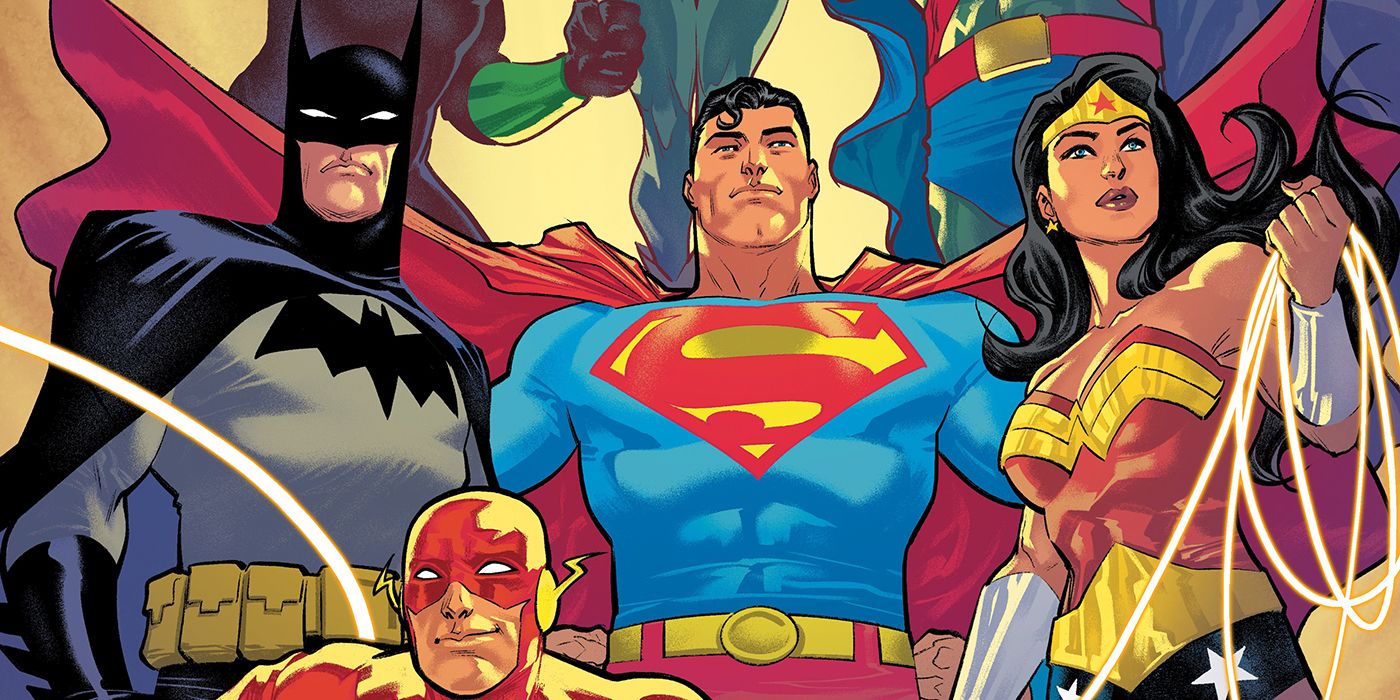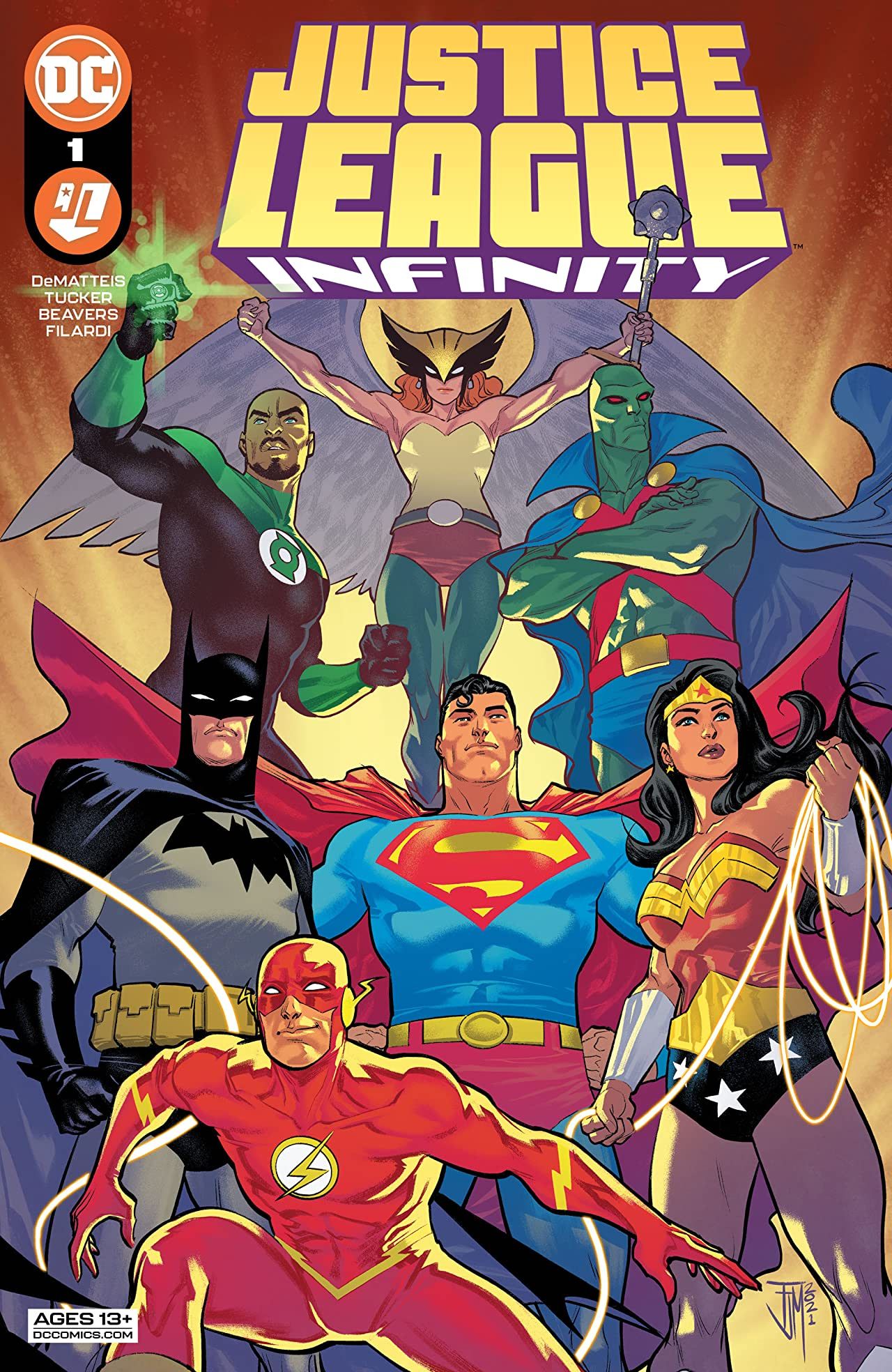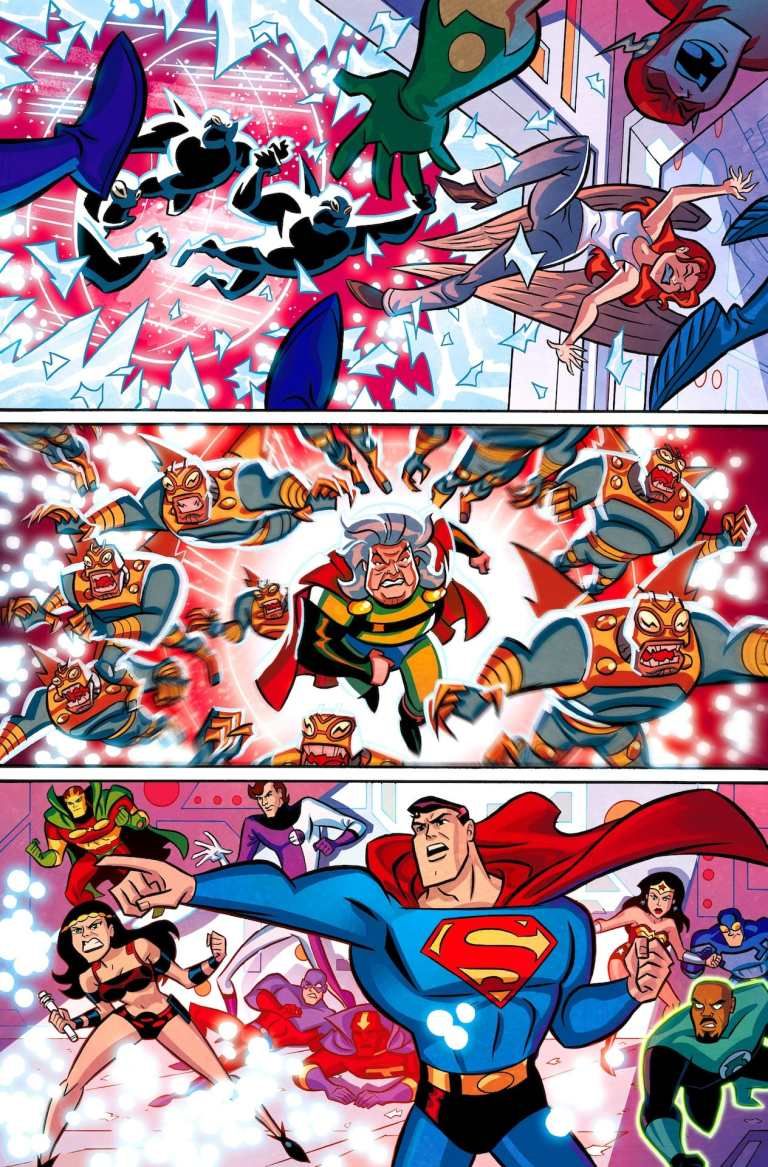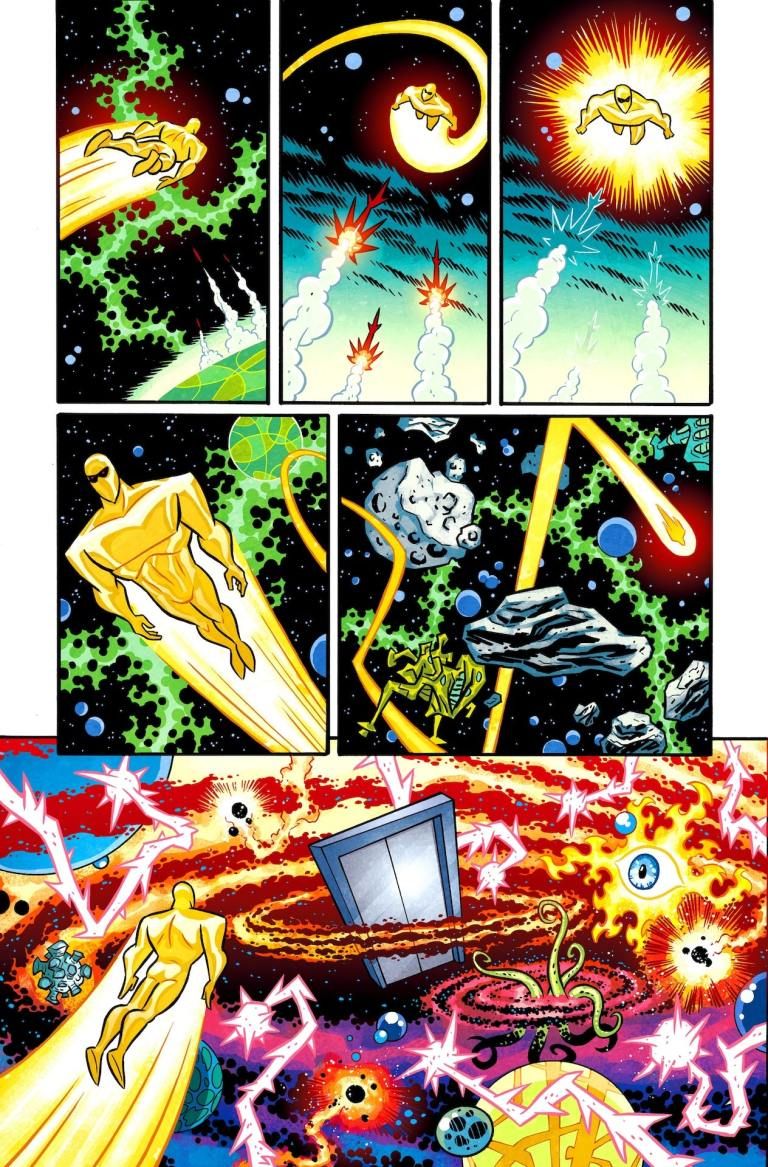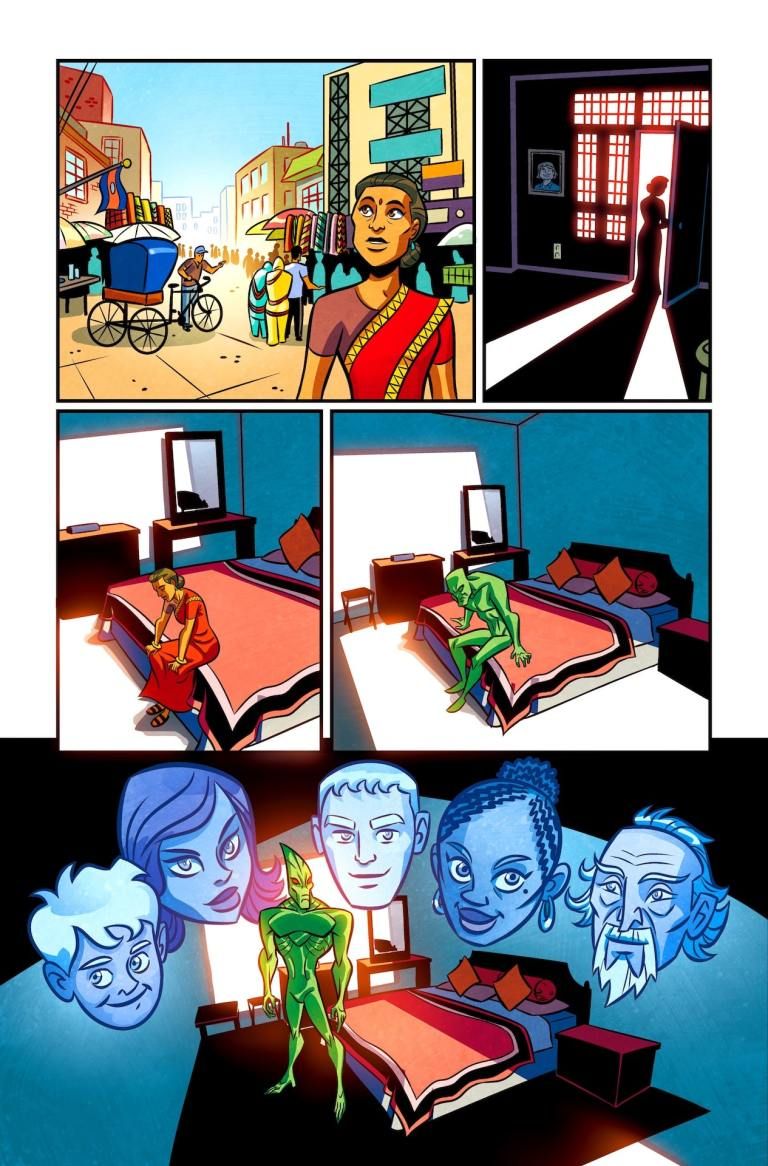Fifteen years ago, the acclaimed animated series Justice League Unlimited came to a triumphant close. Set within the DC Animated Universe that began with Batman: The Animated Series, the series was produced by James Tucker with many episodes written by Eisner Award-winning creator J.M. DeMatteis. Now, the animated series' story is continuing in DC's new seven-issue comic miniseries, Justice League Infinity. Reuniting Tucker and DeMatteis, with art by Ethen Beavers, the story takes the League on a cosmic adventure.
In an exclusive interview with CBR, DeMatteis and Tucker discussed revisiting the beloved animated world they helped create over a decade ago, what characters take point in the story and what lost and unresolved plotlines from the story are revived in this new continuation. Also, included with this interview is an unlettered preview of the first issue, drawn by Beavers and colored by Nick Filardi, and the first issue's cover, illustrated by Francis Manapul.
Here we are, fifteen years since the end of Justice League Unlimited. How is it to come back and continue the story of the animated series with this comic?
James Tucker: For me, it was great! [Editor] Andrew Marino at DC asked me about a year ago and I was hesitant because, like anything, at the time I wasn't sure how I'd feel, even doing it as a comic book and not a full TV [series], with the pressure and eyes on it. And then I thought about it and Andrew pitched a premise that kind of intrigued me and then I got on board and thought "It's a pandemic. What else am I going to do?" [laughs] I have to say it's been really, really rewarding and probably the most rewarding thing I did during the whole pandemic creatively. Working with J.M. has been a dream -- we've worked together but never one-on-one like this -- and it got me through the pandemic, to be honest.
J.M. DeMatteis: On my end, it was a no-brainer really. I had done a little bit of animation before Justice League Unlimited but it was never a major goal in my life and working on that show was the thing that opened the door for my love of writing for animation and my entire career in animation that has gone on for all these years. Looking back, it's a show that has seemed to grow in stature over the years in the response that I see from people. I think it was very much appreciated while it was on but, as the years have gone by, people really see that this is one of the most definitive versions of the Justice League that has ever been done.
For me, it was like "You want to work with James Tucker and go back to Justice League Unlimited?" Why would I say no? Echoing what James said, we've worked on a bunch of things together in animation but this is the first time we've worked together in this one-on-one way and it's just been really delightful, not just creatively but personally, to work with James on this. It's been great.
This is your first time working together in the comic book medium, with Ethen Beavers on art -- whose work looks straight from Bruce Timm's original designs. How has that been?
Tucker: I knew it would be easy with J.M. because I've met him and he's just a great person, apart from just the talent and history; I've been reading J.M.'s [work] before I was even in animation. As far as the book goes, I knew J.M. had the goods, he wrote some of the more popular episodes of the series and other series I've done too. It was more about talking about life in general: When I go back and look at this book, I'll know it was created at a time that was so unique to this country and my life. Ethen cold-called me, like how I got into animation and sent me a packet of his drawings years ago. We've used him on different projects but I don't think he's had something tailor-made for his abilities like this project and what he's delivering is so amazing, it felt as close to doing the show as doing the show.
DeMatteis: As a freelancer working on these shows (I wasn't on staff), the process is awesome that we get on the phone and just talk about the story. That's what James and I did a lot this year and I used him as our expert because if he said this would've worked for the show, it was good, and if he said it wasn't consistent with what we did, then we wouldn't do it. Just getting on the phone and bouncing around ideas for an hour, for me, there's nothing more fun talking with someone like James, who really knows the story. It became more like play than work but then work came and I had to go off and write the damn thing. [laughs] That aspect of just working out the story with James was just pure pleasure.
Tucker: Once Andrew pitched me a general direction of this multiverse theme...when he first asked me, he didn't include that idea so I was thinking of some other stuff. When he pitched the multiverse thing, I thought it was a lot of confusing stuff but then I remembered that one of the thoughts we had about continuing the show, before we were discontinued, was to send [the Justice League] out into space on a quest and explore. I saw the kernels of that kind of idea in what Andrew pitched to us but then J.M. really fleshed out everything: The themes, the story, the connective tissue. I consider myself a consultant for what could've done and this could've been a movie or a miniseries, we could extend the series off of this book alone.
At the start of this story, you've got Amazo and Martian Manhunter and they feel like two sides of the same existential coin. What was it about returning to this world from these two perspectives?
DeMatteis: You hit it right on the head because one of the big themes for the story that goes back to the series with Amazo is "Who am I? What is my purpose? Why am I here?" The big cosmic and personal questions. That's what's J'onn is going through in a big way and what Amazo is going through and it's a thread and theme that runs through the entire seven issues. Kicking it off with those two characters really roots that theme and makes it clear really right from the get-go. I have to also add that Martian Manhunter, from my days writing JLI with [Keith] Giffen, just remains one of my all-time favorite characters. He was such a great character on the show and it was really, really a delight for me to return to this character, that I've spent so much time during my career and get to write him again.
With Justice League Unlimited, you had an embarrassment of riches, expanding beyond the original seven to the entire DCU. Were there other characters you wanted to revisit?
Tucker: I was interested in touching on the relationships: Batman and Wonder Woman -- we think their relationship is more of a friendship at this point but it's open to interpretation. John, Shayera and Mari, we left their relationship in a nebulous area for the fans and I wanted to pick up that thread. I was really interested in the relationships and all of those pertaining to the main seven characters. There are so many types of stories we could've done, based on where we left off with Unlimited. I'm glad this is more of a Big Seven featured story because we had gotten away from them by the time Justice League Unlimited was done and it became more of a broad ensemble anthology almost so it was nice to touchback with the core characters.
DeMatteis: There's a lot of focus on that core group of characters so we're not exploring more obscure characters from the DC Universe but, at the same time, once we go out into the multiverse, it gives us an explosion of other characters. There are characters you'll recognize but we're treating this as the show so these aren't the DC Comics versions of the characters, this is the [DCAU] version of the characters.
Tucker: Part of me earning my keep was making sure it felt like something we'd be doing for the show. The cartoons are one thing and the books are another but sometimes the comic books would do something that we would never do on the show just because it serves no purpose [for the show]. We take what the source material gives us, squeeze it in and that's what you end up seeing on the show. That's what my job kind of was, making sure whatever we included that was introduced in the comics would've gotten the seal of approval for what we would've done in the DCAU.
DeMatteis: This is very much in my brain like we're writing the show. I'm not writing any DC Comics versions of the characters, this is the next season of the show as far as I'm concerned. This is that version of the universe and it just happens to be in comics this time and not on TV.
In regards to Ethen, what made him and his art style the right choice to collaborate with for this?
Tucker: The main criteria is that you at least understand the principles that Bruce Timm introduced into his style which is mostly comics stuff. There have been a lot of artists on the books tied to animation but comics are more their thing so they don't always follow the style of the show. This is as close as to looking like Bruce Timm drew it as you can get, as far as I'm concerned. Not that Ethen is just a Bruce Timm clone but he understands the principles and, wherever he does his own thing, it still feels tied to the world that's been created. It's hard to say because the criteria was to draw this as if Bruce Timm had drawn it. I know Bruce and what he would do and there were instances where it wasn't exactly what he would've done but only he would know that. [laughs]
I thought it was important to replicate the feel of watching the show in pictures. We could've done it any number of ways and still said it was tied to the show and there are probably fans who wouldn't have cared how it looked if we said it was a continuation of the show. But I thought it was very important for me selfishly to feel like I was working on the show again and the look is a huge part of that. I knew Ethen was a cool dude, he's done a lot of good work for us in the past before and he should be getting more attention and I hope this book pushes him into that realm of being able to do what he wants to do.
DeMatteis: He started out of the gate great but each issue is better than the one before it. He just turned in one issue, without giving anything away, that needed to get very Kirby-esque and he just blew the doors off of everything with this issue.
Tucker: This is a very challenging story, it changes everything. J.M.'s scripts are amazing in that they're full of intimate details and these hugely metaphysical, mind-expanding stakes. Both things are happening at the same time and this is something we'd see when we were working with him on animation: How do you wrap your mind around this stuff?! Some of it is very metaphysical and Ethen has been nailing it every single time.
Apart from this magical mystery tour across the universe, were there any other unused plot ideas from the show you wanted to reuse here? Basically, I'm asking if we're finally getting the "Misfortune Cookies" episode.
DeMatteis: James, do you remember that? It was a story you guys handed me that dealt with Martian Manhunter and his cookie addiction called "Misfortunate Cookies." Dwayne [McDuffie] and Stan [Berkowitz] got me on the phone and gave me the basics of this story and, at first, I thought they were pulling my leg. [laughs] But we took it and developed it and I wrote the outline and, for whatever reason, it was decided that we were not going to do the story. I put the outline on my website a couple of years ago and it's a big, fun, goofy story and the running thing is J'onn's addiction to cookies and he becomes a ticking time bomb and basically blows up.
Tucker: Wow! Where was that script when we did Batman: Brave and the Bold? I forgot about that!
DeMatteis: It would've been a great Brave and the Bold! But to answer your question, although they are individual stories in this, it is really all one big, epic story. In this recent issue we mentioned with Ethen blowing the doors off, it's focused on Wonder Woman but it's all still a part of this massive, multiversal epic that's going on. If we got to keep going, it'd be fun to do one-off stories and treat each issue as an episode.
Tucker: Yeah, kind of how JLU was almost an anthology but with an arching story within it.
What are you most excited about getting to revisit this world and continue its story?
Tucker: The fans have been really loyal and patient, the furor for getting something started up has never died down, if anything, it's increased. Being able to do something that at least gives them that feeling of the show is really gratifying.
DeMatteis: I see it on social media all the time, there is just a great, great love for this show and people really want more of it. And this is an opportunity, aside from us revisiting these characters that we love, it's an opportunity to give people a chance to walk through the door and back into that universe. To do it in a comic book form, the difference is, in terms of the writing, when you're telling a story on television, you're usually just telling it through dialogue and action. Whereas with a comic book, you can get into first-person captions and narration and deepen the stories and literally get into people's heads.
We deliver everything that was delivered on the show and, in some ways, get to drill even deeper into these characters from our series. That, for me, was really fun because to replicate it is one thing but, to deepen and expand the universe a little bit, is a nice thing and I hope we did that at least a little.
Written by J.M. DeMatteis and James Tucker and illustrated by Ethen Beavers, Justice League Infinity #1 goes on sale July 6 from DC Comics.

